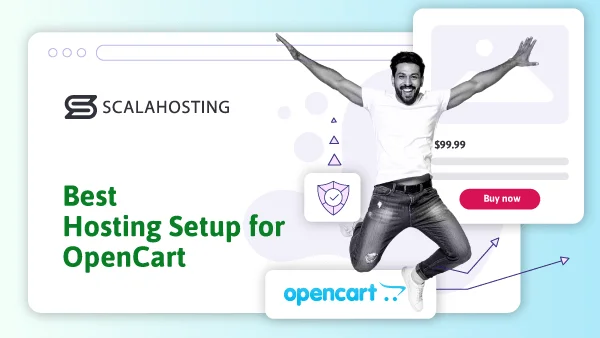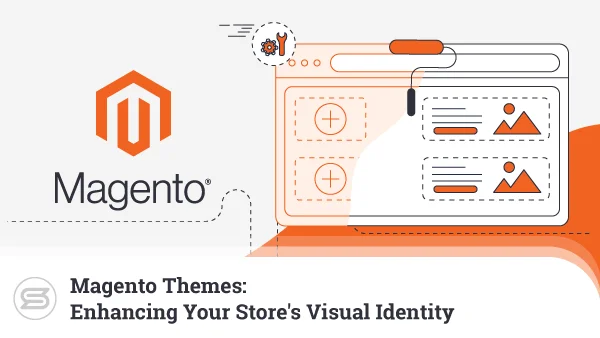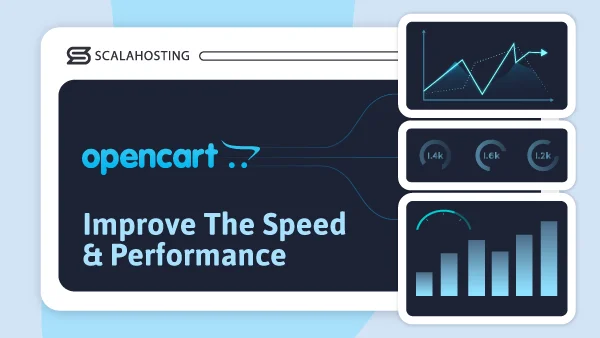Best Ecommerce Platforms in 2025 for Every Business Type
Choosing the right ecommerce platform can make or break your online business. With so many options on the market, it’s easy to get overwhelmed by flashy features and big promises.
That’s why we’ve taken a hands-on approach—personally testing and evaluating the leading ecommerce platforms to find out which ones truly deliver.
In this guide, we break down the best ecommerce platforms based on real-world use, performance, key features, price, and specific advantages. Whether you’re launching your first store, running a fast-growing brand, or managing a complex enterprise operation, we’ve identified the top solutions for each unique need.
Let’s dive into the platforms that stand out the most:
Best Ecommerce Platform Overall
Recommended: WooCommerce
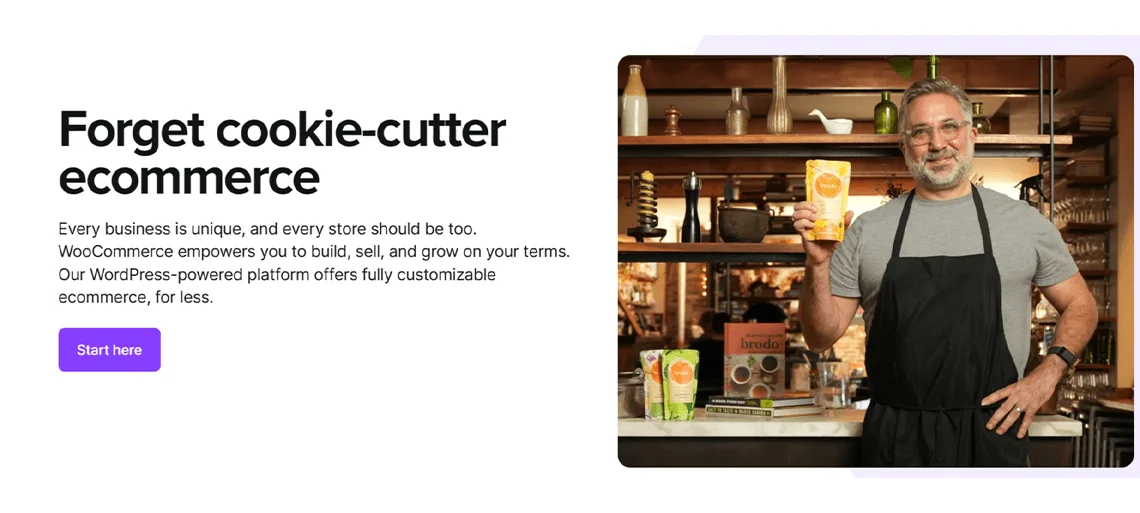
WooCommerce is an ecommerce plugin for WordPress, the most popular content management system (CMS) for building websites. What started as a simple add-on in 2011 has grown to live a life as a fully-fledged online shopping solution with a solid market share of 23%+ (some sources even put it way over the 30% line).
The WooCommerce statistics tell it all:
- Constant growth since 2020 – from 1.4 million online stores to 4.6 million.
- Over 329 million app downloads, with 7 million active installations.
- Among the top 1 million websites, about 14% use WooCommerce.
- Most users switch to WooCommerce from Shopify, Custom Cart, and Wix.
Many big-name brands fell in love with WooCommerce as well. Nutribullet, for example, happily reports a 35% surge in conversions since they started using the platform for their ecommerce needs.
Key Features
- Flexible Payment Options – Woo is great for setting up different kinds of payment gateways, supporting most popular solutions. Whether you want your clients to pay via credit cards, bank transfers, cash-on-arrival, Apple Pay, Paypal, Stripe, or even their very own Woo Payments – WooCommerce has the answer.
- Unlimited Customizations – You can find WooCommerce stores in practically every niche, and for a good reason, too. The application is extremely versatile, allowing you to set up all kinds of product options – size/material variations, subscriptions, bundled items, discounts, and automatic tax calculations.
- Developer-Friendly Environment – WooCommerce might be perfect for novices, but those with more programming experience have tons of opportunities as well. The modular architecture helps you transform your online store as per your requirements. At the same time, solutions like WP-CLI, the REST API library, and the Components package let you dive even deeper into Woo development.
- Multilingual Platform – Woo is a solution aimed at worldwide commerce, so the developers are constantly trying to shorten the gap between sellers and their audience. The app is fully translated into over 24 languages, and various plugins can shift its dashboard and frontend to the chosen vocabulary. Multiple currencies are supported as well, catering to the specific regulations of local markets.
- Built-in SEO Features – Building a great store is one thing, but promoting it to as many people as possible is a different story. Luckily, WooCommerce lets you tick the essentials in your SEO checklist right from the get-go. Think of permalinks, metadata, redirects – you have it all.
Why Do People Choose WooCommerce for Ecommerce?
- Open-source and free by default – no monthly or transaction fees required
- Extremely scalable and able to transform into any kind of online store
- Huge add-on architecture – thousands of plugins and themes available
- Easy to integrate with all major ERP, CRM, and marketing solutions
- Adaptable to any business model – physical, digital, and subscription-based products/services are all supported
How Much Does WooCommerce Cost?
WooCommerce is an open-source product based on WordPress, so its usage is completely free for individuals and businesses.
There is a premium version for big companies called Woo Enterprise. Depending on your size and needs, the WooCommerce Team can provide a custom quote.
Bottom Line
WooCommerce is by far the best ecommerce platform for a reason. It is the most versatile solution for online stores with the richest feature set and integration options. Furthermore, the product is in active development, regularly gets new updates, and has a huge community. The support options are practically endless.
What is the Best WooCommerce Alternative?
Recommended: OpenCart
Why is OpenCart the Best Overall Ecommerce Alternative?
- OpenCart is perfect for first-time users, with clean interface and straightforward options
- Built-in multistore capabilities to easily manage numerous online stores from a single dashboard
- Unlimited categories and products for scalable online shops
- Ready out-of-the-box with a very low learning curve
- Free, open-source, transparent development
- Responsive themes that look great on PC, mobile, or tablet screens
Best Ecommerce Platform for Small Business & Startups
Recommended: WooCommerce

Among many other benefits, WooCommerce is undoubtedly a perfect ecommerce choice for novice users and startups. The platform has been developed with ease of use in mind, allowing people with little to no knowledge to create amazing online shops.
Regardless of whether you want to build a simple storefront for a few products or plan to sell thousands of goods to an international audience – Woo can answer your call for help. Simplified inventory management, shipping options, and payment process – that’s what WooCommerce is all about.
Key Features
- Guide for New Store Owners – Starting off with WooCommerce, you have tons of learning materials in the form of tutorials, video guides, forum topics, and many more. This wonderful guide specifically targets startup online shops, covering every essential aspect of building your storefront.
- Customizable Checkout Page – The checkout process is a make-or-break element for many shops. WooCommerce users can easily tailor their page to maximize conversions – each field can be rearranged using the block editor to keep the flow of the sales operation.
- AI Setup Wizard – If you are a startup or small business, WooCommerce can take your hand right from the start and go through the basics with you. Complete a simple test explaining your business ideas, and the intuitive setup wizard will configure your shop in a matter of minutes.
- Product Categories, Variations, Attributes – When shopping online, we want to learn as much about the product as possible, seeing that we cannot physically check it out. Woo store owners can easily deliver that with as much detail as possible, making their products more visible for search engines in the process as well.
- Effortless Inventory Management – Dealing with a lot of products can often get confusing, but not when you have the right ecommerce platform by your side. Woo makes it easy to track your products in stock, hide out-of-stock goods, and get notifications when an item is close to zero quantity.
Why do Startups and Small Businesses Choose WooCommerce?
- Sell anything – physical, digital, and subscription-based products are all supported
- Extremely scalable – can support your online shop from Day 1 to an international enterprise
- Advanced marketing automation with Klaviyo – ideal for B2C projects
- Thousands of add-ons and integrations – 100+ themes and 1,000+ plugins in the official Woo Marketplace alone
- Complete control over customizations – can be transformed into any kind of online store
- The largest and most active CMS community – you can get extra help from thousands of different sources
How Much Does WooCommerce Cost?
WooCommerce is an open-source platform that is completely free for use by individuals and businesses. Perfect for startups and small businesses on a budget.
Notable Alternatives
PrestaShop, OpenCart, Shopify (hosted)
Bottom Line
Startups and small businesses do not need a ton of fancy options and endless configurations to get their online stores going. Simplicity, functionality, customizability, and, of course, performance are at the back of their minds when choosing their next ecommerce platform. WooCommerce ticks all the boxes, which is why 1 of every 4 shops is built with the WordPress-based app.
Best Ecommerce Platform for Enterprise & Large Business
Recommended: Magento
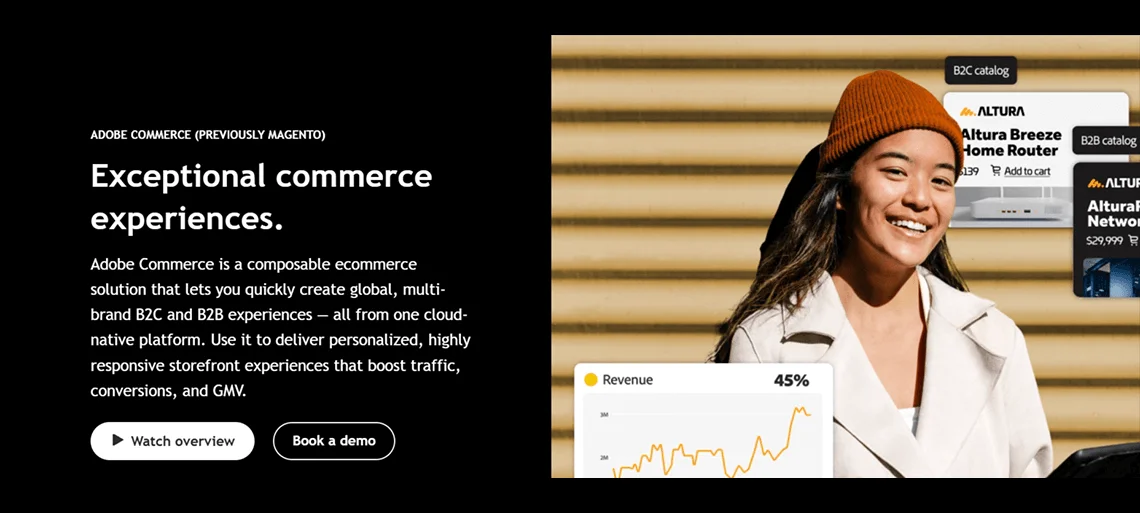
Magento is an ecommerce content management system utilized by almost 3% of online stores worldwide. Suitable for both B2B and B2C projects, this open-source platform is perfect for heavy-duty online shops with huge audiences and very high traffic. Coca-Cola, Land Rover, Ford, and Liverpool FC are all massive international brands that trust Magento for their ecommerce needs.
In 2018, Adobe acquired Magento and added it to its growing family of business-oriented products.
Key Features
- Visual Storefront Editor – Making your sales pages visually appealing is one thing, but combining that with lightweight and SEO-friendly architecture will guarantee optimal traffic and conversion rates. Magento offers pre-built storefront components to make your site launch even faster.
- Journey Optimizer – Another way to boost conversion rates is to personalize the entire sales journey to meet specific client needs. With Magento, you can do that across the board – email, web, app, mobile, and even in-person channels can be customized.
- API-First Composable Options – This one will certainly impress developers as it allows them to push pre-composed changes through a central hub without the need for upgrades. This is especially valuable for large businesses that cannot afford any service interruptions.
- Accelerated B2B Sales – Packed full of personalization options, Magento allows you to set up customer roles, permissions, client-specific catalogs, payment options, and self-service accounts, to name a few. Users can even negotiate price quotes, something rather common when dealing with B2B and large-volume sales.
- Multi-site Support – Different markets and audiences come with their specifics, so setting a multi-site storefront is not uncommon for growing online shops. You can configure different brands or store locations while operating them from a centralized dashboard.
Why do Enterprises and Large Businesses Choose Magento for Ecommerce?
- Limitless enterprise scalability on a cloud-native platform
- Ecommerce and marketing combined – great content creation tools and business automations
- Numerous back-office integrations for improved operational efficiency
- Seamlessly connects with existing CRM, ERP, and PIM systems
- Advanced security for enterprises that includes PCI compliance, WAF, and AI-powered threat detection
How Much Does Magento Cost?
Magento supports an open-source version, which is free to download and utilize for an online shop.
Additionally, you can consider one of the enterprise premium solutions:
- Cloud Service (SaaS)
- Dedicated Cloud (PaaS)
- Adobe Commerce Optimized
Prices for those services are custom and available via a personal quote.
Notable Alternatives
OpenCart, Ecwid, WooCommerce, BigCommerce (hosted)
Bottom Line
Gartner, one of the biggest research and advisory firms, recognizes Magento as a leader in digital commerce.
Coca-Cola achieved an 89% conversion rate for re-engaged users. Nissan saw a 44% increase in site visits. Helly Hansen enjoyed a 40% boost in online sales revenue.
Best Ecommerce Platform for Fashion & Clothing Brands
Recommended: PrestaShop
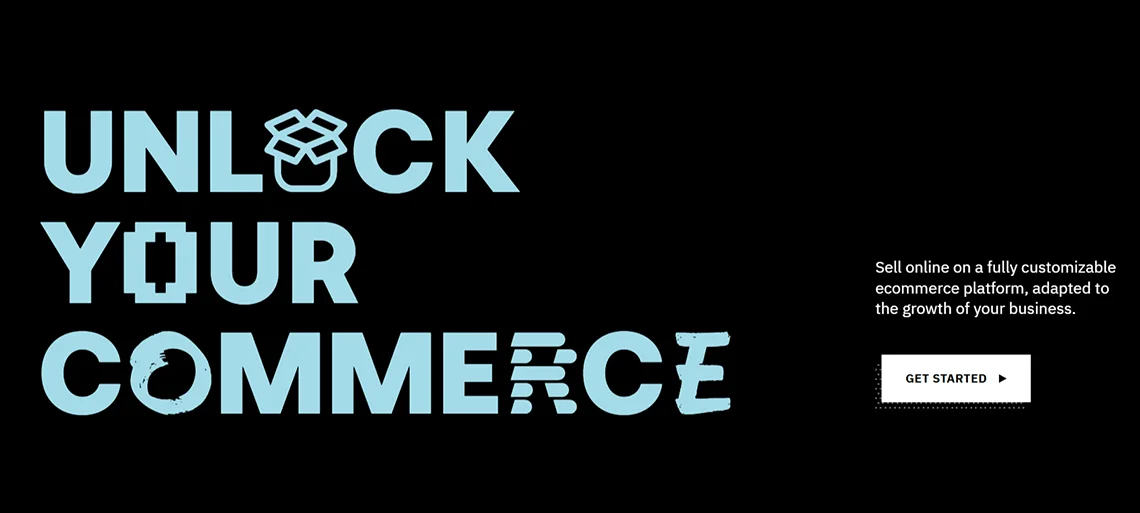
Another freemium platform, PrestaShop has been around since 2007, powering 300,000+ stores in over 60 languages. This app is heavily focused on amazing visuals and layouts, which makes it a top ecommerce choice for fashion and clothing online shops, niches that must WOW visitors at first glance.
PrestaShop is strongly preferred by European customers, with big brands like Decathlon France, Lan Technology, and Groupe Avril all enjoying what the platform has to offer.
Key Features
- Customizable Storefront – Designers love PrestaShop as they have the freedom to change its outlook however they want. There are tons of pre-made templates, but you can also find customizable layouts, color schemes, and typography to give fashion online shops a really unique outlook.
- Multi-channel Support – PrestaShop devs are well aware that clients have to be approached via multiple channels in different ways, giving you the option for a tailored customer journey in each one. Whether you bet on website, mobile, social, catalog, point of sale, or all of them – you can make clients feel special.
- Easy Item Tracking – Offering items that are no longer available is a big no-no in the world of ecommerce, especially in the fashion niche. It leaves clients with a sense of disappointment after looking for the right product for so long. PrestaShop allows you to set comprehensive tracking and get timely notifications before an item goes out of stock.
- Various Payment Methods – New ways of handling money are popping up quite frequently, so any ecommerce store owner logically wants to cover as many of them as possible. Presta lets you easily connect to top payment vendors and offer products/services via credit cards, bank transfers, PayPal, Skrill, Worldpay, Apple Pay, Bitcoin, and many more.
- Cart Abandonment Notifications – Buyers sometimes lose focus when shopping online, especially when dealing with different brands, browser tabs, etc. Instead of letting potentially interested users forget about your deals, you can gently remind them of your goods via automated messages in cases of cart abandonment. This is an easy way to boost conversions and ROI.
Why do Fashion & Clothing Brands Choose PrestaShop for Ecommerce?
- Visually impressive pre-made templates and highly customizable layouts
- Reduced costs to start a business – no CMS license and many free add-ons available
- Superior built-in product filtering, crucial for fashion catalogs with advanced faceted search
- Multi-store capabilities to easily manage multiple fashion brands through a single admin area
- Seamlessly works with a large number of products and quantities without performance slowdowns
How Much Does PrestaShop Cost?
The classic, self-hosted PrestaShop version is free, and you can use it with any hosting provider.
You can also choose a hosted plan on the Presta servers, coming at 24 EUR/mo (without VAT). An enterprise ecommerce plan is also available, with a custom rate, depending on your online project.
Notable Alternatives
WooCommerce, OpenCart, Wix
Bottom Line
Ecommerce for Fashion & Clothing is one of the fastest-growing niches, accumulating millions of sales every day. PrestaShop is a well-suited solution for such online stores, as it shines with stylish visuals and comprehensive backend management.
Best Ecommerce Platform for Dropshipping
Recommended: WooCommerce + Spocket
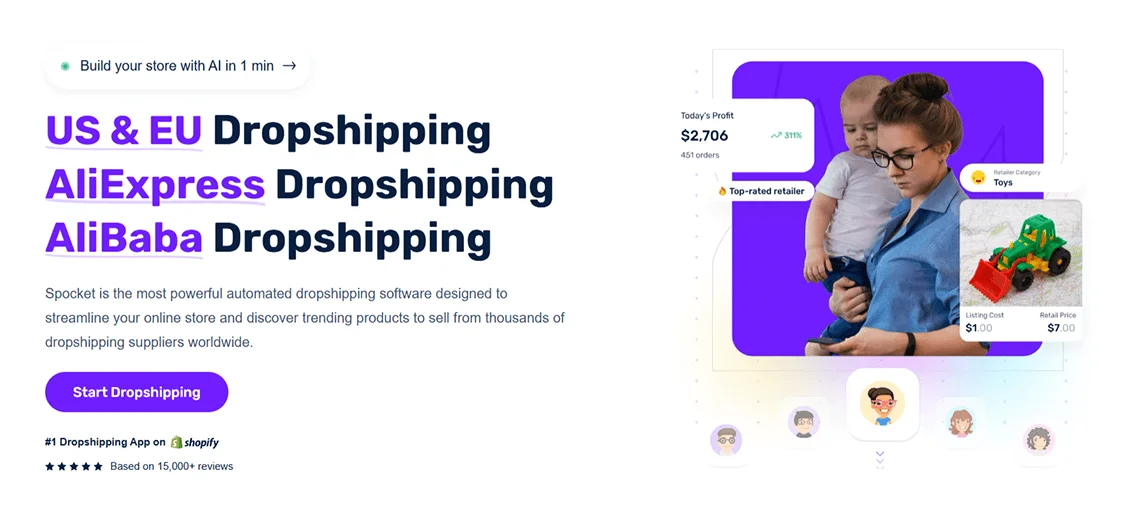
Dropshipping is an ecommerce business model that allows you to enter the market with minimal investments and upfront costs. Efficient inventory management and easy scalability are integral in sustaining such a model, and few can do that better than WooCommerce paired with the Spocket plugin.
Whether you want to dabble in tech, footwear, automotive, or home & garden products – Sprocket can connect you with the best suppliers to get your store going.
Key Features
- Winning Products – Spocket makes it effortless to discover products in high demand, allowing you to start a business with items that are sure to rake in some sales. Just pick a category of products and see its best-sellers.
- Product Trend Analysis – Another way to determine the right products for your dropshipping business is to take advantage of readily available market data and identify the hottest trends and niche offerings. If you love reading data – this one is a no-brainer.
- Top Suppliers from Any Region – Spocket connects you with the biggest suppliers regardless of your location. Alibaba, the top retail manufacturer in China, is one of the most popular options, but if you want to go for local suppliers in the US or EU – countless other companies are only a click away.
- Print on Demand – Customers strongly value personalization when shopping for clothes. With Spocket, you don’t have to own a printing studio to offer this service – a wide variety of merchandise can be tailored to the exact client specifications.
- No Minimum Order Quantity – When launching a dropshipping business, many store owners prefer to first test the waters before jumping headfirst with significant financial investments. You can easily do that with WooCommerce+Spocket – simply order a few products to see if there is any interest before you expand your operations.
Why do Businesses Choose Spocket for Dropshipping?
- Tool automation allows you to run a dropshipping business without much management
- Integrations with the biggest ecommerce platforms – WooCommerce, Shopify, Amazon, eBay, etc.
- Easy scrape and import of AliExpress products
- Huge product catalog of over 100 million items
- Manage multiple online stores from a single account
How Much Does Spocket Cost?
Spocket offers 4 premium plans, all coming with a 14-day free trial. You can go for:
- Starter – 25 unique products – $39.99/mo
- Pro – 250 unique products – $59.99/mo
- Empire – 10,000 unique products – $99.99/mo
- Unicorn – 25,000 unique products – $299.99/mo
Spocket also offers a Cancel Anytime option, which lets you change your project setup without losing any money.
Notable Alternatives
AliDropship, WooDropship, DropshipMe
Bottom Line
While dropshipping is a fairly different endeavor than building an online store with your own products, WooCommerce and Spocket make it a risk-free business model with lots of opportunities. The plugin is beginner-friendly, highly functional, and connects you with top international suppliers with award-winning products.
Best Ecommerce Platform for Developers
Recommended: Saleor
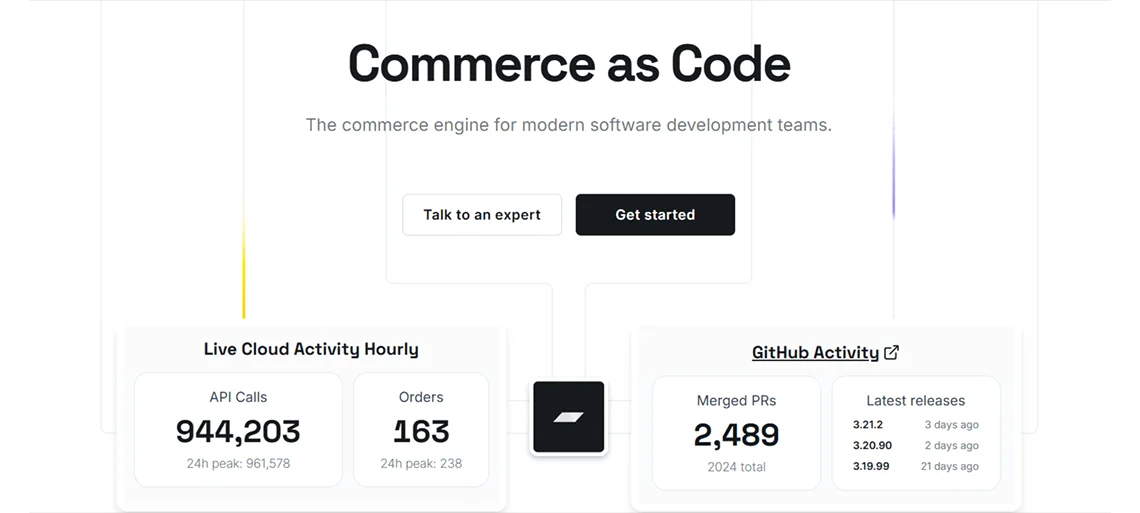
Saleor is a headless ecommerce platform built on Python and Django. Its GraphQL API allows you to separate the ecommerce backend from your storefront and experiment with different setups for maximized results. This gives developers total customization freedom to utilize different frameworks and deploy the user interface that is most optimal for their users.
Key Features
- Docker Support – Docker is one of the top solutions for easy app deployment via containerization. It simplifies the work of web developers and DevOps engineers, and Saleor fully supports this infrastructure setup.
- Complex Product Catalogs – You can easily build sophisticated catalogs containing items with various attribute types, including text, numbers, boolean dates, and different data formats.
- Аdvanced Filtering – Especially convenient for bigger ecommerce shops with lots of products, you can help visitors find the right item with careful filtering. This includes prices, sizes, brands, colors, and more.
- Multi-Warehouse Support – Suitable for dropshipping and international businesses, you can consolidate products from different locations and shipping zones, thus offering a much wider choice and optimizing the sales process.
- 140+ Webhooks – Webhooks help developers integrate your Saleor store with external services to further customize the order process, payment updates, account notifications, and more.
Why do Developers Choose Saleor for Ecommerce?
- Headless architecture with API-first approach to separate frontend from backend
- GraphQL API for ultimate control, handling complex queries, and building dynamic interfaces
- Modern tech stack, including Python, Django, Docker, PostgreSQL, and more
- Custom apps and webhooks allow for limitless scalability and enhanced functionalities
- Optimal performance, even with complex catalogs and high traffic volumes
How Much Does Saleor Cost?
Saleor offers three fixed plans, depending on your sales volumes:
- Select – up to 200k GMV/mo and 10M API requests – $1,599/mo
- Volume – up to 1M GMV/mo and 50M API requests – $3,999/mo
- Enterprise – Custom rate
The application is available as a cloud, on-premise, and self-hosted solution.
Notable Alternatives
Magento, Medusa, Shopware, Vendure
Bottom Line
Saleor is an excellent eCommerce platform for developers due to its modern, API-first architecture built with Python and GraphQL. This architecture enables high flexibility and seamless integration with custom frontends or third-party services. Its headless approach allows developers to build tailored shopping experiences across web, mobile, and beyond.
Best Ecommerce Platform for Beginners
Recommended: OpenCart
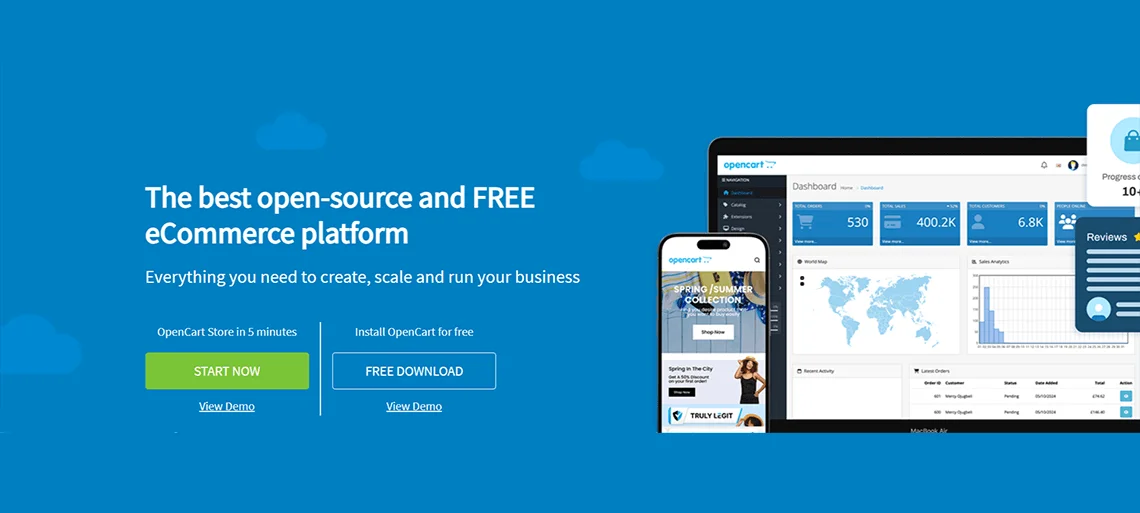
OpenCart is another popular open-source platform for building ecommerce websites, operating under the GNU General Public License. This shopping cart is very straightforward for beginners, installed in seconds, and able to sustain both small and big online shops. Growing your business is easy with OpenCart, as its extensions ecosystem contains over 14,000 add-ons, with more added on a regular basis.
Known brands that use OpenCart? Hobbii, CatSmart, and the Walton Group are just a few names from over 450,000 clients all over the world.
Key Features
- Product Options and Attributes – You can assign your items a wide variety of attributes (size, color, brand, etc.). Those attributes can then be used in the filtering options to improve product discoverability.
- Recurring Billing – Ideal for memberships and subscriptions, OpenCart allows you to sell products/services with recurring payments. Instead of relying on your customers to renew their subscriptions at the end of every period, you can automate the process and guarantee timely payments.
- Reward Points System – Fostering customer loyalty is one of the most important goals for ecommerce entrepreneurs. Reward points are a wonderful way to give something back to your most devoted users, and OpenCart offers that option built-in by default.
- One-Page Checkout – Slow and inefficient checkout process is one of the main reasons for abandoned carts and diminishing sales. Utilizing a one-page checkout will guarantee you collect only essential client information, shorten the order process, and lose much fewer potential customers.
- Analytics Dashboard – Knowing your potential clients and their behavior is key to understanding the right approach to promote your products. This is why marketing information is vital. OpenCart offers a built-in dashboard where you can observe details about your clients, orders, sales, traffic, and other essential KPIs.
Why do Beginners Choose OpenCart for Ecommerce?
- Intuitive interface with logical navigation and inventory management
- Very low learning curve, allowing for easy site creation and management
- Many essential features are available out of the box, with a ton more possibilities through extensions and third-party integrations
- No coding required – themes and add-ons can be added with a few mouse clicks
- Very SEO-friendly – metadata, sitemaps, and search engine-friendly URLs available without plugins
How Much Does OpenCart Cost?
OpenCart is free to download and install, no initial investments are needed apart from domain name registration and web hosting services.
Notable Alternatives
WooCommerce, PrestaShop, Shopify
Bottom Line
OpenCart stands out as an excellent ecommerce platform for beginners thanks to its straightforward setup, intuitive admin panel, and rich set of built-in features. With no coding required for basic functionality, strong community support, and the flexibility to expand into multiple stores, languages, and currencies, OpenCart offers the perfect balance of simplicity and power for beginner users.
What About Shopify?
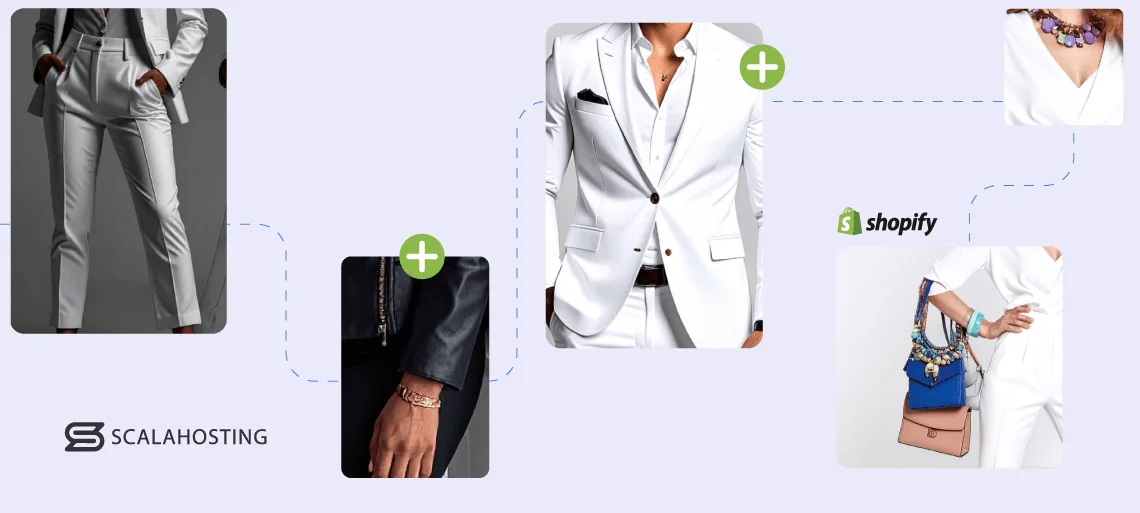
Let’s be clear – Shopify is undoubtedly a worthy mention whenever we discuss the topic of ecommerce. The shopping cart app powers over 4 million online shops worldwide and shines with its stylish designs and fast performance.
However, one thing comes as a big concern, especially if you’re looking for a long-term ecommerce business.
Lock-in issues from the hosted environment.
- Zero migration path – your store architecture can’t be moved
- Forced to use Shopify Payments or pay a +0.5-2% penalty on every sale
- Limited staff accounts with premium cost for adding more
- Infrastructure middleman tax: Shopify runs on Google Cloud infrastructure optimized for hosting millions of stores, but not YOUR store. You’re paying for their scaling needs, not yours. With self-hosted, you choose web hosting optimized for your specific performance and budget requirements.
Most people overestimate the difficulty of running self-hosted platforms and underestimate Shopify’s long-term costs. Here are some quick stats to back that up:
- Setting up WooCommerce or OpenCart: Few hours
- Transaction fees: None
- No limits on products or inventories
- Living with Shopify fees: Forever
Don’t get us wrong. We are well aware that, in some cases, a hosted solution like Shopify or Wix might make sense. Some examples include:
- Short-term pop-up stores (3-6 months)
- Testing product/market fit before infrastructure investment
- Temporary and seasonal businesses
For anything beyond temporary stores, smart businesses choose self-hosted platforms. The “complexity” is a weekend-long learning curve, while platform fees are forever. Not to mention the endless possibilities of growing and scaling with a solution like WooCommerce or OpenCart.
What to Do Instead?
Self-hosting isn’t scary. It just means you control your store’s software and infrastructure. Sure, proper management takes a little bit more effort, but the potential results far exceed the minor setbacks.
Here is the modern self-hosting reality:
- Managed hosting covers the “hard parts” – updates, security, backups, performance, and maintenance.
- One-click installs – your shopping cart can be up and running in minutes.
- You own everything – the website data, customers, and infrastructure are dedicated to your needs alone.
- Scale on your terms – upgrade hosting as your shop progresses, not when forced by some absurd limitation.
Starting with self-hosting is actually far easier than many people believe:
- Choose managed hosting
- Register a domain name
- Install your chosen platform (usually one click)
- Pick a theme and customize
- Add products and attributes
- Start selling
Things really are as simple as that. The underlying costs also tip the scales in the direction of self-hosted solutions:
- Shopify: starting from 19 EUR/mo for a very basic setup + transaction fees
- Wix: starting from $17/mo for only 2GB storage + transaction fees
- Self-hosted: starting from $14.95/mo for a fully-featured account, 50GB space, no hidden costs or transaction fees.
Bottom Line
With managed hosting, running WooCommerce or OpenCart is no harder than Shopify – you just own the result. Most businesses save $10-50k within 3 years while maintaining full control of their future.
Conclusion
Choosing the best eCommerce platform depends on your business needs, budget, and technical expertise. Whether you prioritize ease of use, customization, or scalability, platforms like WooCommerce, OpenCart, and Magento offer different benefits. By evaluating key features and long-term goals, you can select the right platform to support your online growth.
